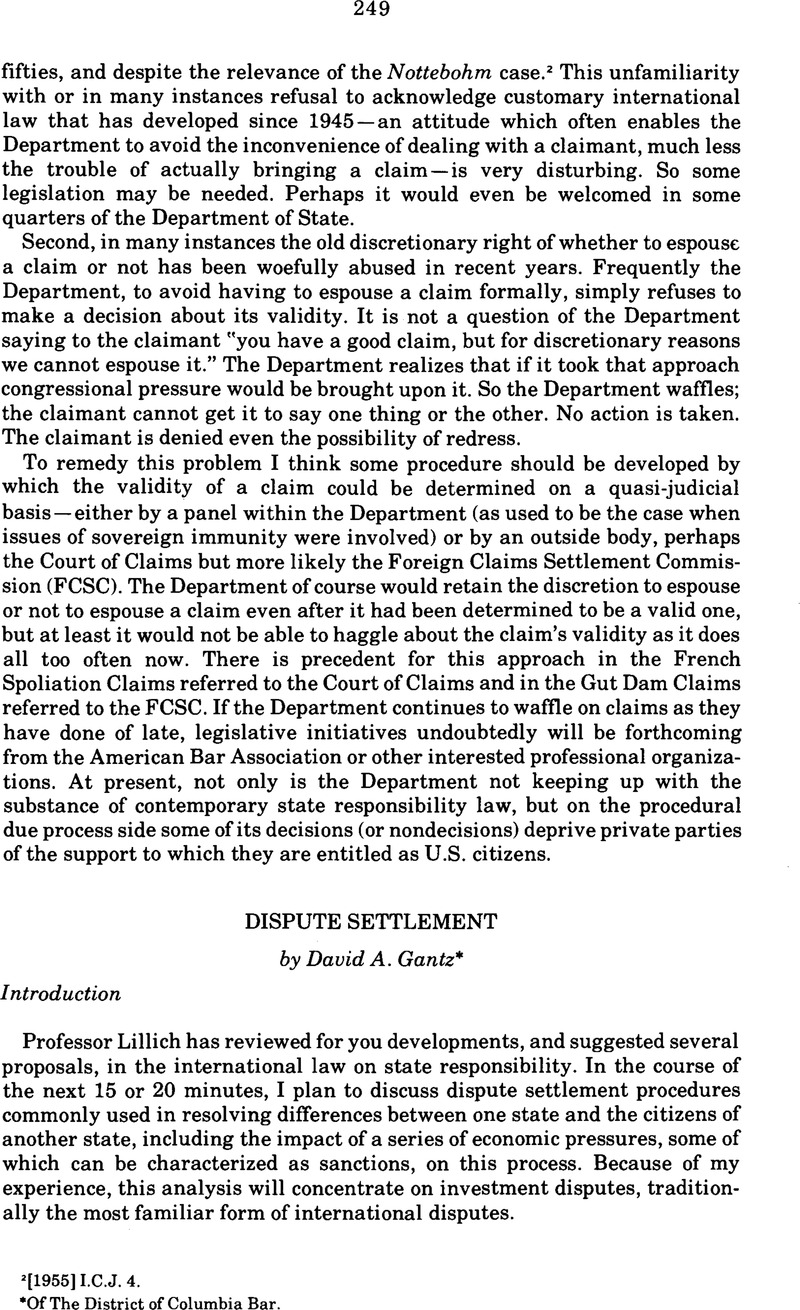No CrossRef data available.
Article contents
Dispute Settlement
Published online by Cambridge University Press: 28 February 2017
Abstract

- Type
- State Responsibility, Self-Help, and International Law
- Information
- Copyright
- Copyright © American Society of International Law 1979
References
1 P.L. 95-223, December 28, 1977, 91 Stat. 1625; see Determination under Trading With the Enemy Act, House Doc. No. 95-380, September 11, 1978.
2 Sec. 621 (e)(2) of the Foreign Assistance Act of 1961, as amended; § 21 of the Inter-American Development Bank Act, § 12 of the International Development Association Act, applicable to the World Bank, and § 18 of the Asian Development Bank Act; Sec. 502(b)(4) of the Trade Act of 1974.
3 Sec. 621(e)(1) of the Foreign Assistance Act of 1961, as amended; See also the Foreign Sovereign Immunities Act of 1976, October 21, 1976, P.L. 94-583, 90 Stat. 2891, Secs. 1609, 1610(a)(3).
4 INR, Disputes Involving U.S. Foreign Direct Investment, 5-6 (Report No. 855, September 19, 1977, Annex D).
5 They are not, of course, relevant in all cases. Where a country is otherwise ineligible for U.S. aid or international bank lending — as in the case o f Venezuela and Australia —and has a credit rating which encourages private bank lending, only the more imponderable investment climate and good bilateral relations pressures have any relevance.
6 In the vast majority of these cases, Department of State officials and foreign service officers abroad studiously avoid taking anyformal position on the merits, or suggesting what amounts might be considered reasonablein terms of a settlement. This also is inevitable in any context where the U.S. Government does not make an independent evaluation o f the merits of the case or the value of the claim.
7 Of course, the interest of OPIC, which necessarily is concerned with protecting its insureds and avoiding losses, and those of the Departments of State and Treasury, which are sometimes more generally concerned with bilateral foreign policy issues and investment protection in general, do not always coincide. There have been a few cases (e.g., Reynolds Aluminum in Guyana) in which an OPIC-negotiated settlement resulted in an agreement framed in terms not considered satisfactory by the other agencies. While such settlements may be acceptable in cases where only private parties are involved in negotiations, they are more difficult to justify when an arm of the U.S. Government, OPIC, is the principal negotiator.
8 Because of progress in the negotiations, tariff preferences were never suspended, and some lending, both bilateral and multilateral, continued.
9 See Gantz, The Marcona Settlement: New Forms o f Negotiations and Compensation for Nationalized Property, 71 AJIL 474 (1977).
10 Whiteman, , 3D amagesin International Law 2068a-2068j (1943)Google Scholar.
11 The Guatemalan case related to expropriation of lands owned by the company under a Guatemalan agrarian reform program. Guatemalan Government compensation, in the form of 25-year 3 percent Agrarian Reform Bonds, was refused. The claim was presented to the Guatemalan Government in April 1954; in June, theGuatemalan Government was overthrown and, in December, a successor government signed amended contracts with the United Fruit Company. In 1955, the French Government nationalized a public utility, most of the stock of which was owned by an American citizen. As the compensation offered by the French Government was not acceptable to the U.S. citizen shareholder, although it was to some of the French shareholders, the U.S. Government espoused the claim and determined its value at $6 million. Before the claim could be settled, the American citizen died and willed his shares to the American Hospital in Paris, which ultimately settled the claim for about $2 million.


